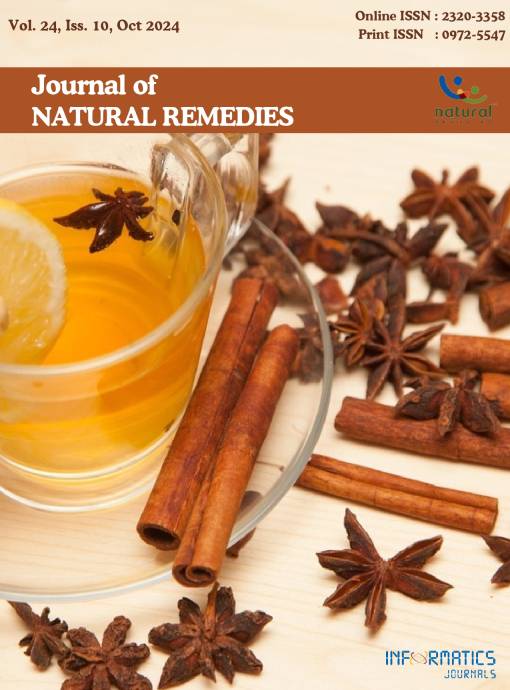A Case Study on the Therapeutic Efficacy of Suttigai (Thermal Cauterization) in the Management of Kaalani (Corn Foot)
DOI:
https://doi.org/10.18311/jnr/2024/35106Keywords:
Cornfoot, External Therapy, Kaalani, Para Surgical Procedure, Siddha, UlogasuttigaiAbstract
A 45-year-old, moderately built female presented with complaints of a thickened layer of skin in the foot with severe pain for over three years. She was diagnosed to be affected by Corn foot which is equated to Kaalani in the Siddha system of medicine. Corn is a well-defined focal region of hyperkeratosis. As a result of repetitive mechanical stress from friction or pressure forces, corns are formed as thickened skin lesions. Suttigai is one of the treatment modalities indicated for Kaalani in Siddha. Uloga suttigai is superior among all suttigai procedures and an effective treatment for Kaalani which prevents recurrence was chosen to treat corn foot. A Visual Analogue Scale(VAS) was used for the criteria of assessment of pain. The patient was treated successfully by uloga suttigai with the total repair of corn without any unsightly scar or discoloration. No other complications and remissions were found.
Downloads
Metrics
Downloads
Published
How to Cite
Issue
Section
License
Copyright (c) 2024 R. Keerthika, C. Kalaiarasi, D. Periyasami, M. V. Mahadevan, V. Mahalakshmi, P. Samundeswari, N. J. Muthukumar (Author)

This work is licensed under a Creative Commons Attribution 4.0 International License.
Accepted 2024-08-19
Published 2024-11-06
References
Takehara K, Oe M, Ohashi Y, Tsunemi Y, Kadowaki T, Sanada H. Differences between patient-reported versus clinician-observed nonulcerative signs and symptoms of the foot in patients with diabetes mellitus. J Wound Ostomy Continence Nurs. 2019; 46(2):113-116. https://doi.org/10.1097/won.0000000000000504
Garcia CA, Soler FC. Effect of debridement of plantar hyperkeratoses on gait in older people - An exploratory trial. Arch Gerontol Geriatr. 2018; 78:7-13. https://doi.org/10.1016/j.archger.2018.05.017
Leikin JB. Foot disorders in the elderly: A mini-review. Dis Mon. 2018; 64(3):63. https://doi.org/10.1016/j.disamonth.2017.08.002
Das S. A concise textbook of surgery. 2006; p.122.
Bhat S. SRB’s Manual of surgery. CBS Publishers and Distributors Pvt Ltd. 2014; 4:pp.167.
Farndon L, Barnes A, Littlewood K, Harle J, Beecroft C, Burnside J, Wheeler T, Morris S, Walters SJ. Clinical audit of core podiatry treatment in the NHS. J Foot Ankle Res. 2009; 2(1):7. https://doi.org/10.1186/1757-1146-2-7
Elwell R. The management and treatment of hyperkeratosis. Br J Nurs. 2017; 15(10). https://doi.org/10.12968/npre.2017.15. sup10.4
AlAboud AM, Yarrarapu SNS. Corns. Stat Pearls Publishing. 2022. https://www.ncbi.nlm.nih.gov/books/NBK470374/
Bhat S. SRB’s Manual of 14 surgery, skin tumors. CBS Publishers and Distributors Pvt Ltd. 2014; 4:p.171.
Thiyagarajan R. Siddha Maruthuvam Sirappu. Directorate of Indian Medicine and Homoeopathy. Chennai-106. 2013; 4.
Uthayamarayan CS. Siddhar Aruvai Maruthuvam. Directorate of Indian Medicine and Homeopathy. Chennai-106. 2005; 4.
Ponnayapillai T. Pararasasegaram-Part 5. Virus Printers. 2016; p.152.
Bodian CA, Freedman G, Hossain S, Eisenkraft JB, Beilin Y. The visual analog scale for pain. Anesthesiology. 2001; 95:1356-1361. https://doi.org/10.1097/00000542200112000-00013
Delgado DA, Lambert BS, Boutris N, McCulloch PC, Robbins AB, Moreno MR, Harris JD. Validation of digital visual analog scale pain scoring with a traditional paperbased visual analog scale in adults. J Am Acad Orthop Surg. Global research and reviews. 2018; 2(3):e088. https://doi.org/10.5435/jaaosglobal-d-17-00088
Phillips S, Seiverling E, Silvis M. Pressure and friction injuries in primary care. Prim Care. 2015; 42(4):631644. https://doi.org/10.1016/j.pop.2015.07.002
Ramasubramanian TS, Sivakumar VT, Thirumalai AV. Antimicrobial activity of Aloe vera (L.) Burm. f. against pathogenic microorganisms. J Bio Sci Res. 2010; 4:251258.
Arunkumar S, Muthuselvam M. Analysis of phytochemical constituents and antimicrobial activities of Aloe vera L. against clinical pathogens. World J Agric Sci. 2009; 5(5):572576.
Hajhashemi V, Ghannadi A, Heidari AH. Anti-inflammatory and wound healing activities of Aloe littoralis in rats. Res Pharm Sci. 2012; 7(2):73-78. PMID: 23181083
Sanchez M, Gonzalez-Burgos E, Iglesias I, GomezSerranillos MP. Pharmacological update properties of Aloe vera and its major active constituents. Molecules. 2020; 25(6):1324. https://doi.org/10.3390/molecules25061324
Kumar M, Singh L. Application of Agnikarma in the surgical practice book. pp.81.
Sharma AV, Dudhamal TS, Gupta SK, Mahanta V. Clinical study of Agnikarma and Panchatikta Guggulu in the management of Sandhivata (osteoarthritis of knee joint). Ayu. 2016; 37(1):38. https://doi.org/10.4103/ayu.ayu_103_14
Fein A. Nociceptors and the perception of pain. 2014
Dwivedi AP. An Overview on agnikarma - A minimal invasive procedure. Ayurveda Today Magazine. 2011. p. 15.

 R. Keerthika
R. Keerthika









 0.35
0.35 24
24 0.161
0.161